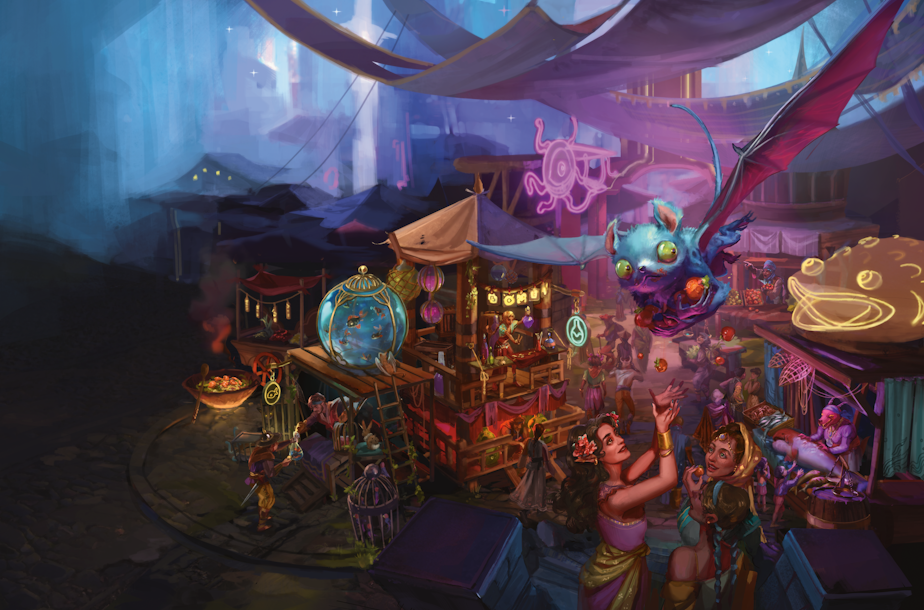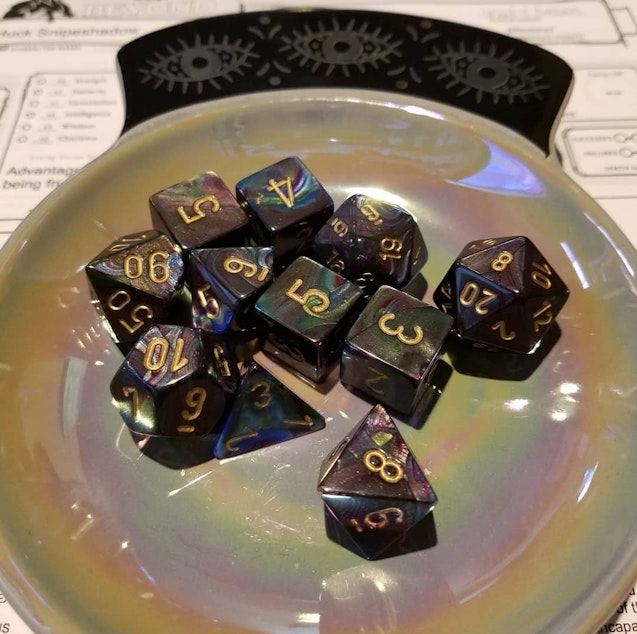D&D's 'Radiant Citadel' changes the game for BIPOC players

If you’re a fan of the hit Netflix show "Stranger Things," then you know that the fantasy tabletop-role playing game "Dungeons & Dragons" has come roaring back into the mainstream in the past few years.
But for most of its existence, D&D has had a problem.
While the adventures were out of this world, and the humanoid avatars were as diverse as the player's imagination, the game was played, and made, primarily by white men.
But a reckoning and an evolution has been under way for several years at Wizards of the Coast, the Renton-based company that makes "Dungeons and Dragons" (Wizards is now owned by Hasbro).
One symbol of that change is the newest D&D adventure book, "Journeys Through the Radiant Citadel," which goes on sale tomorrow.
The book was created and written by an entirely BIPOC team of creators, led by Ajit George. BIPOC stands for "Black, Indigenous and People of Color." George and fellow author Justice Arman told KUOW about their experiences not only playing D&D, but putting together their groundbreaking book.
George says that the book is a quantum leap forward.
Sponsored
"It is a game changer, it feels like it is ushering a new era," he said. "Because you have 16 writers of color that worked on this for two years, there is a complexity and nuance and thoughtfulness in this book that is rare in any medium."
Justice mentions that having an adventure book that you put yourself into is very different from other forms of entertainment, like tv shows or movies.
"If you watch a movie and you see a character who's POC, you might identify with that character, and it might feel good to have that representation," he said. "It's very different to play a game and step into someone's shoes and be in their world to to be able to interact with it."

George also explained that the enormous auroral diamond that the Radiant Citadel is built around was based, in part, on the Statue of Liberty.
Sponsored
"The Radiant Citadel, in many ways, is like a fantasy in New York City," he said. "All of these different cultures have come here for different reasons, under different struggles, in complex circumstances, and in many cases, as refugees."
George said the book speaks to what America meant for his parents and grandparents.
"What this country can be and has been for many immigrants," he said. "And I think that that is really a central part of who I am and what I put into the writing."
Justice says he's excited for people to be able to play in a world made by the people who understand the cultures they're drawing inspiration from.
"What people are going to get is something so authentic, while also feeling so fresh, and so fun to engage with," he said. "In some ways, we're giving people what they want, which is a new culture, to engage with a story that they're getting from the source, they're getting it from people who fundamentally understand the stories who understand the culture, who understand the themes behind it."

For the players' perspective, KUOW talked with two members of the d20 Dames, a family-friendly D&D podcast with a cast that is all femme-identifying and predominantly BIPOC.
Kat Kruger, the dungeon master and defacto host of the podcast, said she was floored by the idea behind the book.
"I was really very excited at the whole idea that an entire book could be written by people who traditionally haven't been given that opportunity," she said. "Even though in recent years more and more of that community is represented in streaming and podcasts, but we haven't really seen that in official products. And so it's very exciting. It feels like a very foundational moment in D&D history, which is so exciting."
Brittni Leigh Liyanage, a player with the d20 Dames, said she too was excited.
Sponsored
"I love this book because I see myself," she said. "As a half-black half-Sri Lankan person I do literally see myself in the book, which I never thought I would see in any D&D book ever."
Liyanage said that, while the book spoke to her, it speaks to the entire D&D community.
"It's beautiful, it's colorful, it's vibrant, it's different," she said. "It's all of these amazing things. But without that support from the general public, the money runs out, the budget doesn't get approved. It really does need to be a community effort."
Kruger said she is optimistic about the future of inclusion in tabletop gaming.
"Thankfully though, we have seen some really great changes," she said. "We've seen great hires, we've seen great content, and I think it culminated into this."
Sponsored
But she said the foundational moment shouldn't stop with the publication of the book.
"It needs to it needs to grow from here and it needs to see more support from the community as well from allies recognizing how important this book is and how how great the content is, how unique it is, and how much flavor there there is," Kruger said. "It's just it's so full of really interesting world building that we have not really seen before. And we want more of that."
You can find the d20 Dames and all of their adventures at d20dames.com.
Journeys Through the Radiant Citadel is out in stores and online Tuesday, July 19.
If you are a Dungeons and Dragons player, or have thoughts about inclusion in gaming, you can share your thoughts on this story at kuow.org/feedback.





